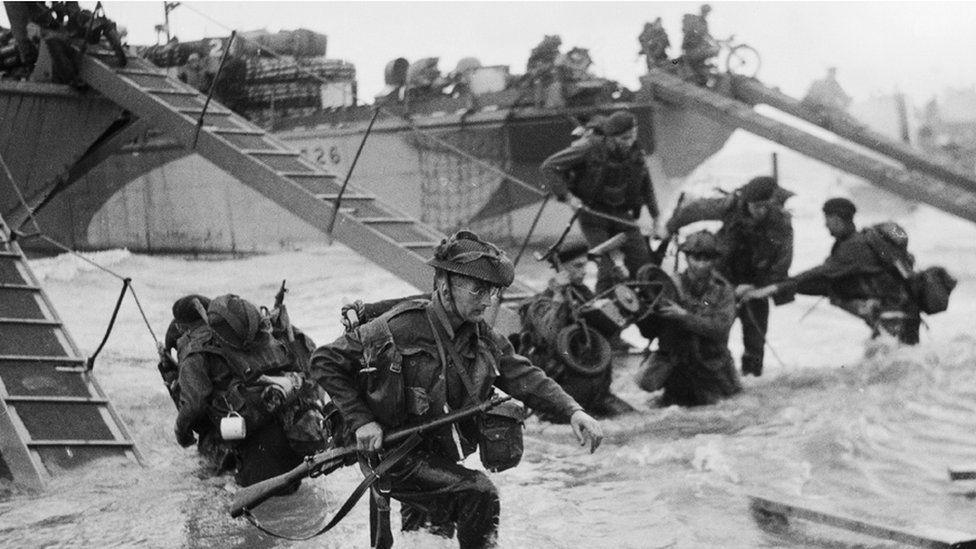Three Welsh veterans tell their D-Day stories

- Published
On the 80th anniversary of D-Day, there are now only about half a dozen surviving Welsh veterans.
Bill Davies, 101, from Porthcawl, Bridgend county, served with the RAF, Richard Thomas Pelzer, 100, from Swansea was a Royal Engineer in the Army while Don Jones, 99, of Mold, Flintshire, manned guns on a Navy landing craft.
Each of their experiences was unique, though there are many common themes.
All were conscripted as teenagers, all spoke of their fear and all recall friends they fought side by side with.
Able Seaman Don Jones had always wanted to join the Royal Navy and leapt at the chance when he was called up.
“We were young men then, at 18 we used to think nothing bad would happen to us. I think most young men felt this way at that time," he said.
The secret D-Day scientists and engineers
- Published1 June 2024
Veteran describes anguish of Normandy landings
- Published3 June 2024
What were the D-Day landings?
- Published6 June 2024
D-Day 80: ‘We worked from morning to night’
Richard Thomas Pelzer was working as a stone mason at the time of his call-up.
“To be honest with you, I wasn’t scared right through it all
"I can’t explain it. I can tell you one thing, the work to be done was from morning to night.
"While we were working we’d see the Spitfires coming over and they’d fly over the beach-head all day.
"I was conscripted on my 19th birthday. I finished my trade on the Saturday, but I had to report to the Army on the Thursday before I finished my trade.
"I was classed as an 'interrupted apprentice', a mason.
"The time I started on my trade involved dressing stone. I was doing the coping-stone for the Rhayader Waterworks extension.
“We were seconded then to ‘the Navy’, but it was really the Combined Ops, external.
"We didn’t know it was time, but we were ready for the invasion: We were the boys that went in to do the beach clearance flotilla."
Don Jones says he and the men around him "were frightened"
Bill Davies, however, was utterly bewildered when he disembarked, without any indication of what he should have been doing.
He landed at Arromanches in Normandy which - although at the centre of the Gold Beach landing zone - was spared the brunt of the fighting on D-Day.
This meant the installation and operation of the port could proceed as quickly as possible without damaging the beach and destroying surrounding lines of communication.
"When we got there, I was flabbergasted! Because I didn’t know much about it.
"There are no docks in Arromanches, so they made like a railway bridge right out to sea, for nearly a mile.
"They were driving this truck on to the pontoon bridge and it would be very wavy."
When he returned years later and saw the photograph of the pontoon bridge, he was amazed.
"I thought to myself 'blimey days! If we’d gone off that railway and tipped over, boy, you were gone!"
The three men’s wars then went in very different directions.
While Mr Davies pushed inland, Mr Thomas Pelzer remained on the beaches to establish the Mulberry Harbours which facilitated the landing of hundreds of thousands of troops and tonnes of equipment.
Mr Jones continued ferrying the landing crafts in more than 20 missions over the next six weeks, which proved vital for supplying the liberation force.
He said: "We’d got used to carrying tanks, lorries, all sorts on the ships, and one of my biggest jobs was making sure they disembarked in order, so there was never a jam at the bow doors.
"Because it was a flat-bottomed boat, you’d be bounced up by the waves, it couldn’t ride them like a hulled ship would, so it was very important to make sure everyone did everything in the right order…but we were just 18-year-old lads doing all of this.
"The first time was the worst. We had our 15-inch guns, but they were firing back.
"One shell went clean through our wheelhouse, but thankfully never exploded – it must have been a dud – we were so lucky that we only had two injuries, my number two lost his hearing for a few days and a gunner on the opposite side took some shrapnel in his shoulder.
“On the third, fourth, fifth drops it was much quieter. The beaches were secure, but the Germans still had guns inland which could fire 20 miles or so out to sea.
"I think we were frightened and I don't think any of us wanted to be heroes or anything.
"But we had the feeling that... when you're a young man, you think 'it can't happen to me and I'll be alright'."
Bill Davies, who served with the RAF, said D-Day left him "flabbergasted"
All three lost, or at least lost touch, with someone special.
Mr Jones’s best friend from school was killed on the Normandy beaches.
The three have mixed feelings about revisiting the sites of the battle.
Mr Jones, who went back five years ago for the 75th anniversary, said: "It was really a marvellous time. It was very emotional."
Mr Davies also went for the 75th anniversary with his nephew and saw the front of the chateau where they were billeted for the first time.
“Uncle Bill," his nephew said, "Uncle Bill, your name is on the monument."
Mr Davies told him to look for the name Robert McCutchen and, upon finding it, found the names of his entire unit.
"I was amazed to see it there,” he said.
As one of the few surviving Welsh D-Day veterans, Mr Jones hopes he can be a part of the commemorative events this week.